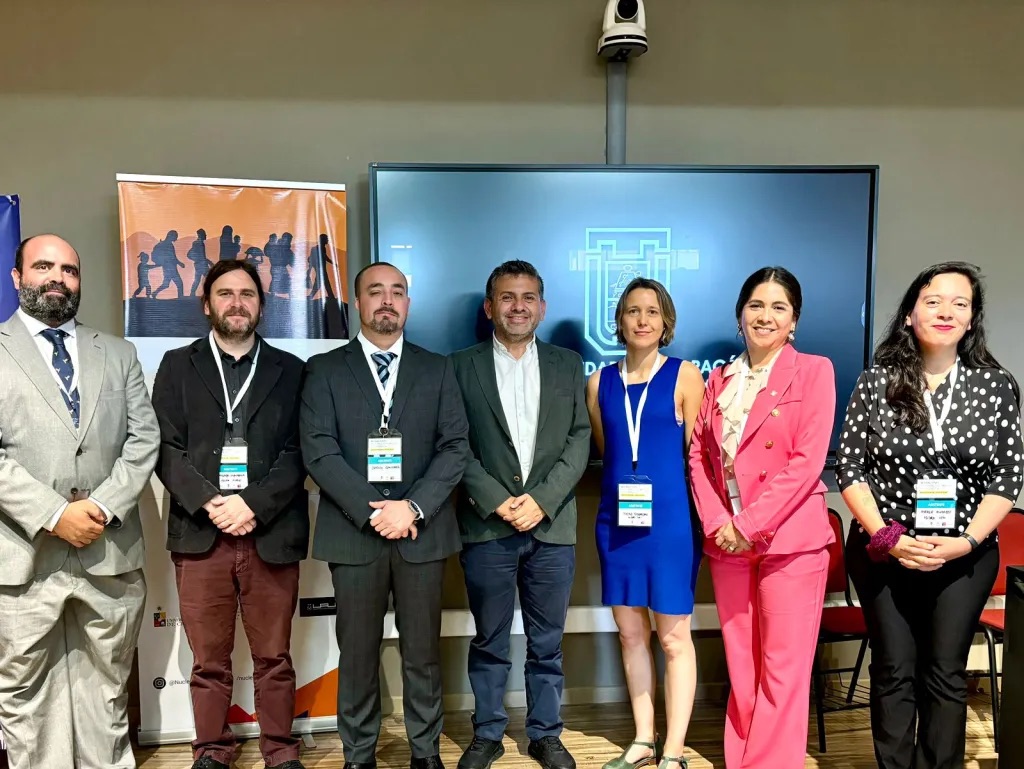
On Thursday, November 7, the Policy Forum “Migration: Border, Integration, and Coexistence” took place at the “Carlos Herrera” auditorium, Saucache campus of the University of Tarapacá (UTA), Arica. The event was organized by the MIGRA Millennium Nucleus and the General Directorate of Community Engagement of UTA.
An open and democratic dialogue on the phenomenon of migration in northern Chile took place during the day’s activities at UTA. Among the authorities present were Arica’s Mayor Mr. Gerardo Espíndola, Presidential Delegate Mr. Ricardo Sanzana Oteíza, UTA’s Rector Dr. Emilio Rodríguez Ponce, and the Director of the MIGRA Millennium Nucleus, Dr. Raimundo Undurraga Riesco.
In his opening remarks, Dr. Raimundo Undurraga—professor at the Department of Industrial Engineering at the University of Chile and Director of MIGRA—stated:
“Over the years, one of the most significant challenges has been protecting the rights of people on the move. Migration, in all its forms, reflects human aspirations and the need to improve living conditions, to seek safety and better opportunities. However, it also exposes millions to risks and rights violations. Today, in a world where migration transcends borders and cultures, we must remember that migrants’ rights are, at their core, human rights.”
The first panel featured Mayor Espíndola, Mr. Darío Sánchez (Regional Director of the National Migration Service), Mr. Patricio Lindeman (Deputy Consul of Peru in Arica), and Ms. Jeannette Alcon (Head of the Migrant Health Program). The session was moderated by Dr. Andrea Alvarado, UTA professor and member of MIGRA’s research team.
The second panel included Ms. Stephanie Coscing (World Vision), Mr. Sebastián Godoy (Municipal Health Department – DISAM), Ms. Verónica Montenegro (Director of Escuela América), and Mr. Daniel Acevedo (AMA Coordinator), and was moderated by Dr. Alejandra Abufhele, UAI professor and MIGRA researcher.
“Dialogue between academia, authorities, and civil society is essential to producing impactful science. We thank MIGRA for creating this space to reflect on the effects of migration based on evidence,”
said Mayra Feddersen, professor at the Faculty of Law, Universidad Adolfo Ibáñez, and principal investigator at MIGRA.
“It is extremely important for the Nucleus to be present in the Arica and Parinacota region. At MIGRA, we understand that one cannot fully grasp the migration phenomenon in Chile without paying close attention to what’s happening in the far north. Arica is a border city and is the first point of entry for the vast majority of people arriving in Chile from other South American countries. As noted during the forum, Arica is a ‘migrant city’, an example for the rest of Chile of how cultures and traditions from various countries can coexist and intermingle—alongside Indigenous and Afro-descendant communities,”
added Andrea Alvarado.
Art and culture also played a key role in the event, which opened with the ancestral Aymara “Pawa” ceremony—a ritual to ask for permission and blessings from Mother Earth before starting a new activity—and included a Tinku dance performance by the “Fraternidad Tinkus Kollas Aymaras.”
Reflecting on the core theme of the forum, MIGRA Director Raimundo Undurraga noted:
“That is the fundamental reason we’ve gathered here today. In this space, academia, policymakers, and civil society come together—in a city and region that understands better than anyone the migration challenges facing the country. The invitation is to share our views and experiences, to learn together. I believe we need each other.”
This is a major event organized by the MIGRA Millennium Nucleus, a project of the Millennium Science Initiative, housed within the Centers Subdirectorate of Chile’s National Agency for Research and Development (ANID), under the Ministry of Science, Technology, Knowledge, and Innovation of the Government of Chile.
Our work is important, so we appreciate it if you cite the use of the code and figures available in this repository.
MIGRA, N. (2024). MIGRA Repository (Version 2.0.4) [Computer software].
@software{MIGRA_Repositorio_MIGRA_2024,
author = {MIGRA, NÚCLEO},
month = may,
title = {MIGRA Repository},
version = {2.0.4},
year = {2024}
}